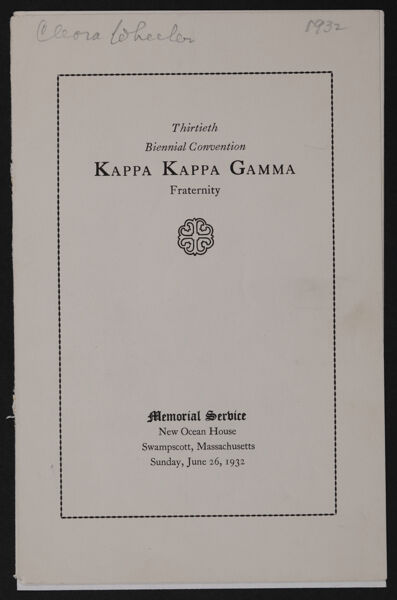



Omicron Chapter was founded at Simpson Centenary College (now Simpson College) in Indianola, Iowa on April 10, 1880. Due to the perceived low standard of the college, the Chapter was closed on February 10, 1890.

65 initiates (as of closure 1890)
A quote from the Phi Gamma Delta quarterly appeared in the December, 1889, issue of The Key: “Kappa Kappa Gamma has revoked the charter of her Omicron…this chapter has existed for about 10 years and we can merely conjecture that the status of the institution failed to keep pace with the fraternity’s advancement, and so representation there became undesirable. The fraternity has made good its loss by placing a chapter in the University of Pennsylvania…the first to organize the newly-established Woman’s Department…”
The Omicron letter that month was cheerful as ever: “Simpson opens this year with a new president and three additions to the faculty…the financial outlook of the school was never brighter—our chapter has eight active members.” Omicron’s June, 1889, letter reported 330 students in the college and a faculty of five…and that very little was accomplished by Omicron in the way of literary work “owing to the shortness of the term.” A few years earlier, December, 1885, the chapter had complained of feeling isolated from her sister chapters and has mentioned attending the national convention. (Omicron did not send delegates in 1881 or 1884.) In June, 1883, The Golden Key carried the chapter’s letter about the many chapter marriages…”What will we do with our girls?” This letter was signed “Bob Proudfoot.”
If Omicron had acted diplomatically, the chapter might have been saved. But Omicron’s next move was to ask to be excused from paying tax to the Fraternity because the girls had been paying for the new science hall at Simpson.
The Grand Council decided that Simpson was not an institution where a chapter should be, and the 1889-90 province vote resulted in the recall of Omicron’s charter. Kate Cross, (Shenehon) then grand president, mentioned, “reports extending over a number of years as to the low standard of the college…” Omicron’s objection, stating that the college had improved since the chapter was placed, was true. The answer was that Kappa, too, had changed, and standards had been raised. Other reasons for withdrawal of the charter included “repeated statements by Omicron regarding faculty opposition”…and “a belief that Omicron was apart…in spirit.” No Omicron delegates attended the 1881 and 1884 Conventions. Moreover, there had been a bad example in 1888 when the delegate arrived late, left early, and showed lack of interest. The Grand Council was sorry and said the decision to remove the charter was not personal but “a desire… to consolidate the Fraternity body so that it might work unitedly…” This was done February 10, 1890, and the charter and archives were sent to the Grand Council on March 7. Omicron had 10 years of relative insignificance.
However, the chapter had one shining star, a member born in Ireland September 25, 1865. This was Kate Shelly, a student at Simpson during 1882-1883. The May, 1883, issue of The Golden Key announced her initiation and referred to her as “our brave girl.” Through her own efforts Kate had saved a train-load of people on the night of July 6, 1881. Kate Shelly came to Simpson as a nationally known heroine…actually internationally known, for she has letters from England, Scotland, and Ireland. She had a medal awarded by the legislature, a handsome gold watch and chain from the Burlington Road, and a beautiful silver lantern from the Chicago Northwestern. Kate Shelly became a Kappa as a member of soon-to-die Omicron chapter. She stayed at Simpson only a year. During this time as an active, she is described as “perhaps a little below medium height, with dark hair, blue eyes, small even teeth, a shapely figure, and a pretty hand and foot.”
In the words of the Omicron correspondent to The Golden Key, “As an example of one of the highest aspects of courage, we are glad and proud to record…Kate Shelly, the heroine who saved an express train at night under circumstances of great danger to herself, whose noble deed was chronicled throughout the country and perpetuated in the popular declamatory verses bearing her name…(is) a member of Kappa Kappa Gamma.” It is good to remind ourselves that in Kate, Omicron had its moment of glory.
The previous information was excerpted from The History of Kappa Kappa Gamma Fraternity, 1870-1976. The information that follows has been gleaned from available resources including Chapter History Reports, chapter meeting minutes, letters and comments from chapter members and alumnae, the Kappa Kappa Gamma Fraternity Archives, and The Key. Each chapter is expected to update its history record annually. Contact Fraternity Headquarters at [email protected] with questions.


